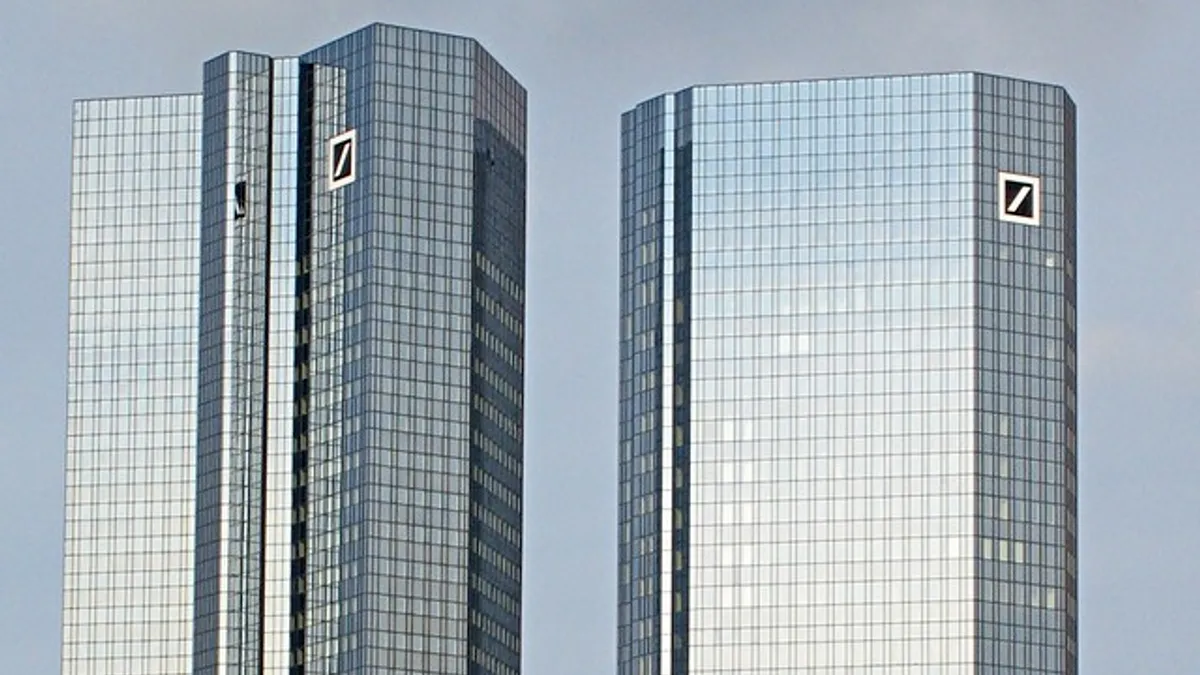Dive Brief:
-
Germany’s largest bank announced yesterday it was cutting a fifth of its global staff as part of a restructuring to reverse years of under-performance even while the banking industry as a whole has been relatively strong.
-
The changes include elimination of its money-losing equities and trading businesses, creation of a “bad bank” to spin off $83 billion in assets it no longer wants, and refocusing on its historical strengths — mainly corporate banking services for German businesses.
- The staff cuts are comparable to the loss of some 16,000 jobs when Lehman Brothers collapsed in 2008, sparking the global financial crisis, and the estimated 26,000 staff cuts Wells Fargo is set to make over the next several years based on a restructuring it announced last year.
Dive Insight:
Christian Sewing, Deutsche Bank’s CEO, released the restructuring plan yesterday.
“What we have announced today is nothing less than a fundamental rebuilding of Deutsche Bank,” Sewing said in a memo to employees. “We are creating a bank that will be more profitable, leaner, more innovative and more resilient.”
Under the plan, the bank will go back to what it was historically good at — servicing corporate clients in its home country — and get out of the global investment banking business, which it entered about 20 years ago when it bought Morgan, Grenfell &. Co., in London in 1990, and then Bankers Trust, the big Wall Street bank, in 1998.
Its global equities operation has been a big money drain. Just last year it lost $750 million on about $2.2 billion in revenues.
To get back to basics, it is creating a corporate bank to house its traditional banking services for corporate clients and maintain a pipeline for them to global markets. That new division will join its existing investment bank, private bank, and asset management unit, known as CWS.
To spin off assets it no longer wants, Deutsche is creating a capital release unit, which, in Wall Street terminology is called a bad bank, because it serves as a clearinghouse for underperforming or non-core assets.
“The term bad bank … is in this case misleading,” Sewing says in his letter to staff. He said the assets are high quality and will be wound down quickly, generating some $6 billion to shareholders by 2022.
Some analysts question how much money the bank can make focusing on its corporate clients. “The strategy of effectively doubling down on the German corporate market, just at a time when maybe the German economy is really rolling over ... in itself is not a key to profitability,” Stephen Issacs, chairman of the investment committee at Alvine Capital Management, said in a CNBC interview.
The 18,000 staff cuts represent a fifth of the company’s global workforce of about 91,000. As of early Monday morning, cuts had already taken effect in many of the bank’s offices in Singapore, Australia, and other mostly Asian locations. The lion’s share of cuts are expected in London and New York City because they're home to its global equities and trading businesses.
“The mood inside is pretty gloomy,” one employee in Singapore said, as reported by Reuters. “People are being called in individually into the conference rooms with a couple of rounds of chats with HR, who will give you this packet then and you are out of the building.”














